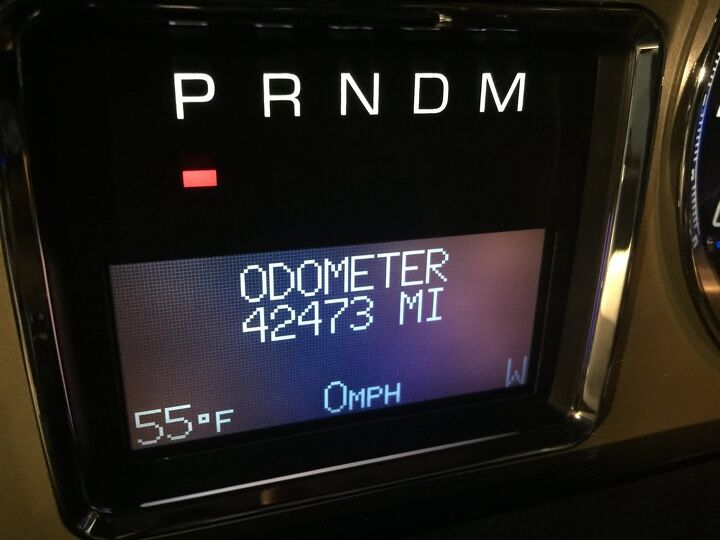Study Claims Odometer Rollbacks Are Making a Comeback

The latest research from Carfax has led the company to report that more than 1.9 million vehicles on the road have rolled-back odometers – noting that this represents a 7 percent increase against the previous year.
“Many people think odometer fraud disappeared with the invention of digital odometers,” stated Emilie Voss, Public Relations Director for Carfax. “But that couldn’t be further from the truth. We’re still seeing the number of vehicles on the road with a rolled-back odometer rise year-over-year.”
Though it’s hard to do a comparison against the glory days (for lack of a better term) of odometer tampering. Automotive aficionado Jay Leno often publicly reminisces about being tasked with rolling back the mileage of cars as one of his very first jobs, jokingly calling it the "odometer re-calibration department" and noting that it was just easier to crack open the dashboard to get your hands on the counter before computers became a factor. But that presumes that the tradition was more rampant then than it is today, something Carfax claims is not the case.
The company believes “it’s never been easier – or cheaper – to remove thousands of miles from a car’s history in one fell swoop” and cited modern technology as giving dishonest sellers more opportunities.
“It takes con artists a matter of minutes to wipe thousands and thousands of miles off a vehicle’s odometer,” said Voss, “and unfortunately these swindlers likely see this unprecedented used car market as a way to make a quick buck.”
Carfax stated that, while even a small adjustment can impact the value of any given automobile by a meaningful amount, most rollback events typically set the vehicle back by tens of thousands of miles. Based on the data used to compile the report, the group estimated that the average consumer loses around $4,000 in value on their purchase – and that’s before we get into the possible repair costs incurred by having a vehicle that’s further down the maintenance schedule than the owner realized.
The National Highway Traffic Safety Administration (NHTSA) also believes that malicious rollbacks are on the rise and estimates that over 450,000 vehicles are sold each year with false odometer readings. This has resulted in consumers being defrauded by roughly $1 billion annually.
Considering the current state of society, it’s getting difficult to believe odometer tampering isn’t a given on secondhand automobiles. We’ve already seen dealers leveraging supply shortages into obscene markups that are padding their bottom line. Energy companies have done the same with fuel prices, with record profitability being the only real consequence. Though, if you think oil concerns are somehow worse than the green menace, let’s not forget just how many electric vehicle startups appear to have turned out to be little more than a convenient way for their founders to launder money. And, boy, do we have some bad news about how efficiently your tax dollars are being spent.
Frankly, I would recommend assuming that literally every interaction one might make could be grounds for a scam. In fact, you’re actually being scammed into believing that you should be more generally skeptical right now. But the truth of the matter is that there’s a very good chance that not all of the alleged odometer tampering was intentional.
Carfax acquires its information from an array of motor vehicle bureaus across the United States and Canada, service centers, repair shops, insurance agencies, rental companies, state inspection sites, fire departments, law enforcement, and even the manufacturers themselves. While this provides a lot of unique data points and useful information, it also leaves room for blind spots and a pretty broad margin for error. Ultimately, the data contained within a Carfax vehicle report is only going to be as good as the documentation it was originally sourced from.
Rounding a vehicle’s mileage is extremely common among repair shops, service centers, and even government agencies. So discrepancies on Carfax vehicle reports aren’t all that rare. If you had back-to-back servicing events where one technician rounded up to 67,000 miles and the next person used the precise mileage just a few days later, it could signal as a rollback event on your vehicle history report. These are things Carfax actively tracks, though it doesn’t guarantee odometer readings as wholly accurate.
But the fact that the company’s vehicle reports often come with blind spots doesn’t change the fact that you probably should be wary of any mileage claims that seem too good to be true. Carfax recommends taking a vehicle in for an inspection to see if the wear on key parts actually matches the number displayed on the dashboard. For example, if the vehicle has some fouled spark plugs or transmission fluid that looks like it’s long overdue for a change, then there’s a good chance that it’s not really a 40,000-mile car. Those are things you could even inspect for yourself, with your mechanic able to check the wear of parts that would be far harder for you to access.
Carfax also recommended using some of its tools (by inputting the VIN) to determine the likelihood of tampering because it’s running a business and didn’t release this study solely for the good of mankind. Though vehicle history reports aren’t a bad thing to ask for and can be a useful item to have at your disposal, even if some of the information runs the risk of being inaccurate.
The NHTSA has some additional tips as well, starting with asking to see the title to see how it compares with the information being displayed by the vehicle. Up-to-date inspection records would also help solve any mysteries about the vehicle’s former life that you might have and it’s similarly worth looking at the inside of the vehicle to check the condition of the steering wheel, pedals, or any other part of the vehicle that comes into routine contact with the driver. However, if you suspect odometer fraud may be at play, the NHTSA doesn’t recommend using it to negotiate for a lower price. Instead, it suggests contacting the relevant enforcement agency in your state.
[Image: JASON TENCH/Shutterstock]
Become a TTAC insider. Get the latest news, features, TTAC takes, and everything else that gets to the truth about cars first by subscribing to our newsletter.

A staunch consumer advocate tracking industry trends and regulation. Before joining TTAC, Matt spent a decade working for marketing and research firms based in NYC. Clients included several of the world’s largest automakers, global tire brands, and aftermarket part suppliers. Dissatisfied with the corporate world and resentful of having to wear suits everyday, he pivoted to writing about cars. Since then, that man has become an ardent supporter of the right-to-repair movement, been interviewed on the auto industry by national radio broadcasts, driven more rental cars than anyone ever should, participated in amateur rallying events, and received the requisite minimum training as sanctioned by the SCCA. Handy with a wrench, Matt grew up surrounded by Detroit auto workers and managed to get a pizza delivery job before he was legally eligible. He later found himself driving box trucks through Manhattan, guaranteeing future sympathy for actual truckers. He continues to conduct research pertaining to the automotive sector as an independent contractor and has since moved back to his native Michigan, closer to where the cars are born. A contrarian, Matt claims to prefer understeer — stating that front and all-wheel drive vehicles cater best to his driving style.
More by Matt Posky
Latest Car Reviews
Read moreLatest Product Reviews
Read moreRecent Comments
- Probert They already have hybrids, but these won't ever be them as they are built on the modular E-GMP skateboard.
- Justin You guys still looking for that sportbak? I just saw one on the Facebook marketplace in Arizona
- 28-Cars-Later I cannot remember what happens now, but there are whiteblocks in this period which develop a "tick" like sound which indicates they are toast (maybe head gasket?). Ten or so years ago I looked at an '03 or '04 S60 (I forget why) and I brought my Volvo indy along to tell me if it was worth my time - it ticked and that's when I learned this. This XC90 is probably worth about $300 as it sits, not kidding, and it will cost you conservatively $2500 for an engine swap (all the ones I see on car-part.com have north of 130K miles starting at $1,100 and that's not including freight to a shop, shop labor, other internals to do such as timing belt while engine out etc).
- 28-Cars-Later Ford reported it lost $132,000 for each of its 10,000 electric vehicles sold in the first quarter of 2024, according to CNN. The sales were down 20 percent from the first quarter of 2023 and would “drag down earnings for the company overall.”The losses include “hundreds of millions being spent on research and development of the next generation of EVs for Ford. Those investments are years away from paying off.” [if they ever are recouped] Ford is the only major carmaker breaking out EV numbers by themselves. But other marques likely suffer similar losses. https://www.zerohedge.com/political/fords-120000-loss-vehicle-shows-california-ev-goals-are-impossible Given these facts, how did Tesla ever produce anything in volume let alone profit?
- AZFelix Let's forego all of this dilly-dallying with autonomous cars and cut right to the chase and the only real solution.


































Comments
Join the conversation
Take a look at the key fob(s) that comes with the car. Most folks stick with the first and will show wear & tear from being dropped multiple times like mine. The second will sit in a tray in the bedroom or in a cabinet. If they only offer one key fob and its spotless, I would be leery.
Also, Carfax is helpful, but not fool proof. I'm in the market for a replacement, and I've seen reports with with significant milage variations, yet, were not flagged on the header page of the report. Some are key punch errors; some VIN # screw ups; but some made me pass on the vehicle in question.
A completely different issue are the flood cars from Florida. Many, many vehicles took the drink in the recent hurricanes. Any car with a Florida history I will pass on for the next few years!!
This is a good article. I can tell you for fact this was happening in the 00s on 90s and early 00s electronic odometers but it was probably 1% or less of all cars because dealer tools were required to interact with the ECU. Today its probably still a rarity but likely up a few pips and easily seen if mileage is tracked in registration or dealer servicing and its 40K less than it should be (worst case, a few thousand miles at a time which is not worth a Federal charge). Title washing and TMU are much more likely.